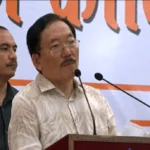At dawn on March 21, 2025, over 200 runners gathered at Yuksam Helipad in Sikkim’s Gyalshing district, their breath visible in the crisp mountain air. But this was no ordinary marathon. Organized under the state’s “Mero Rukh Mero Santati ” (“My Tree, My Legacy”) initiative, the 21-km race aimed to tackle two crises simultaneously: youth addiction and environmental degradation. By the time runners crossed the finish line at Gerethang Bazar, they’d not only burned calories; they’d also kick-started a reforestation project tied to every newborn in Sikkim.
The “108 Trees“ Scheme: A Birthright with Roots
At the heart of the marathon was Chief Minister Prem Singh Tamang’s visionary policy. Under Mero Rukh Mero Santati, parents of every newborn in Sikkim are encouraged to plant 108 trees, a number sacred in Buddhism and Hinduism. The state supports this by opening a fixed deposit account for the child, with funds earmarked for future education.
How It Works:
- Step 1: Parents register their child’s birth and receive saplings from the Forest Department.
- Step 2: Community volunteers monitor tree growth, ensuring survival rates exceed 80%.
- Step 3: The child’s fixed deposit matures alongside the trees, with payouts timed to educational milestones.
“This isn’t just about carbon sequestration,“ explained Minister Tshering T Bhutia at the post-race ceremony. “It’s about giving children a tangible stake in their environment.”
The Marathon’s Double Mission: Fitness and Forests
The Yuksam-Tashiding half-marathon served as a dynamic fundraiser for the scheme. Key details:
- Route: Runners traversed 21 km of biodiverse trails from Yuksam Helipad to Gerethang Bazar, passing through protected forest corridors.
- Participants: A mix of locals and national athletes, including Brahma Lall (Rajasthan) and Priya Tamang (Kalimpong), who won the men’s and women’s categories, respectively.
- Entry Fees: ₹200 per runner, directly funding saplings for newborns.
Amar Subba, Sikkim’s famed “Marathon Man“ and organizer of the Darap 13K Trail Run, emphasized the event’s broader goal: “When youth run toward fitness, they run away from drugs.”
Grassroots Power: How NGOs and Locals Made It Happen
The marathon was a masterclass in community collaboration:
- Local NGOs from Gerethang-Labing GPU handled registrations via WhatsApp, tapping into Sikkim’s 92% smartphone penetration rate.
- The Forest Department provided logistical support, including transportation of saplings.
- Commerce Department-sponsored recycled medals and certificates.
District Collector Tenzing D. Denzongpa praised the model, saying, “Rural events like this boost tourism while keeping youth engaged in constructive action.”
The Addiction Crisis: Running as Rehabilitation
Minister Bhutia didn’t mince words in his post-race address. Citing a 30% rise in drug-related arrests among Sikkim’s youth since 2023, he linked the marathon to the state’s anti-addiction strategy:
- Screen Time vs. Trail Time: “An hour spent running is an hour not lost to mobile gaming,“ noted Bhutia.
- Data Point: According to state health surveys, 72% of participants in Sikkim’s 2024 marathons reported reduced substance use.
Beyond the Finish Line: What’s Next?
The marathon’s success has sparked plans to expand the model:
- Upcoming Events: A Khecheopalri Lake marathon in September 2025, with sapling pledges tied to tourist participation.
- National Interest: Officials from Bihar and Rajasthan have requested blueprints to replicate the initiative.
As runners dispersed from Gerethang Bazar on March 21, the real race was beginning for Sikkim’s newborns, whose first gift from the state would be a forest bearing their name.










